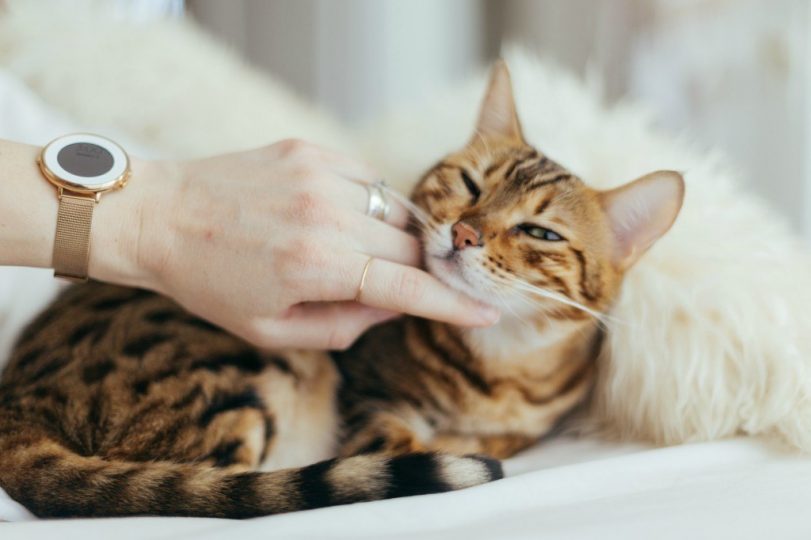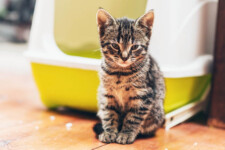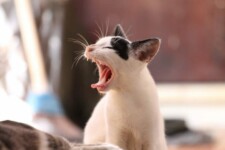Heavy Breathing Cat (Dyspnea): Causes & Treatment
Strenuous exercise, anxiety, stress and excess heat can cause heavy breathing in cats but it should resolve itself after a few minutes of rest.
However unlike canines, cats are not prone to panting and heavy breathing, and it could be a symptom of an underlying health problem like cardiovascular disease.
A cat breathing heavily could be a symptom of a serious underlying illness or injury, and sometimes is just the result of a single event.
Be observant and monitor your cat’s wellness because early detection could be the difference between life and death. If you notice your cat breathing heavy or see other symptoms, consult your vet if the heavy breathing is prolonged and/or appears out of the ordinary.
Let’s take a look at some causes and symptoms of heavy breathing in cats, and what you can do to treat the problem.

Causes Of Heavy Breathing In Cats
The most common causes include:
Airway diseases
Diseases such as feline asthma, pulmonary oedema, and pneumonia can cause heavy breathing in cats.
These diseases impair the ability to get oxygen into the bloodstream hence the cat breaths heavily more rapidly to compensate for inadequate oxygen in their bloodstream.
Check out our all about cat asthma article for a quick look at this problem in cats.
Pulmonary oedema is the most common cause of heavy breathing in cats.
Fluid buildup within the lungs is mainly caused by heart failure due to cardiomyopathy (enlargement of the heart).
It can also be as a result of a ruptured thoracic duct, choking, cancer, electrocution, near drowning, or other systematic diseases.
Pleural effusion is fluid build- up at the pleural space, it is caused by pyothorax, chylothorax, feline infectious peritonitis (FIP), cancer and heart failure – and prevents the lungs from inflating properly.
Trauma
Heavy breathing can be a symptom of trauma.
A fall or blunt force trauma or pain, stress or shock as a result of a traumatic event can cause heavy breathing in cats.
Brachycephaly (short skull)
Cats with snubbed noses and squashed faces experience a lot of health issues including breathing difficulties, elongation of the soft palate, and closed nostrils.
A cat with a short skull lacks room to fit all the requirements needed for normal breathing.
Tear stains can be noticed on the faces of brachycephatic cats.
Obesity
Obese cats experience numerous health problems ranging from acute to chronic illnesses, and difficulty breathing is one of these health issues.
Obesity leads to decreased lung capacity, excess fat build-up around the organs, and weakened muscles.
All these issues result in more work to get enough oxygen into the lungs.
Heartworm
Although it is rare, cats can get heartworm, and heavy breathing is a symptom of heartworm. This disease can be fatal.
To be on the safe side, give your cat a monthly heartworm preventative medication.
Other causes of heavy breathing include pulmonary diseases, airway obstruction, and chest/ throat tumours.
Other Symptoms Of A Heavy Breathing Cat
When a cat is breathing normally, its chest makes small movements.
However, if the stomach and chest make rapid rising and falling movements when your cat breaths, it could be an indication of labored breathing.
Some of the other indicators of heavy breathing are:
- Open mouth breathing.
- Lack of energy.
- Lowered head with the neck and body extended forward.
- Blue-tinged tongue, lips or nose.
- Lethargy.
- Coughing and gagging.
- Rapid rising and falling of stomach/chest.
Diagnosis and Treatment Of Heavy Breathing Cats
As soon as you suspect your cat is experiencing some difficulty in breathing or you notice the symptoms, get in touch with your veterinarian.
A vet will carry out a couple of tests to determine the underlying causes. Blood work, urinalysis and other exams might be conducted.
A comprehensive physical and medical history will help the vet narrow down the potential causes.
Monitor the progression of the symptoms as this information will be helpful to your vet.
Information on injuries your cat might have suffered will help identify the potential trauma that would be making your cat breath heavy.
Blood work is normally done to test the presence of any infections.
Preliminary results from the blood work, physical examination and review of the symptoms may pave way for more examinations like chest x-rays or ultrasounds in order to arrive at a conclusive diagnosis.
These tests help to identify foreign objects, fluid build-up or potential tumors.
The treatment for heavy breathing cats is tailored to the cause.
- In the case of an infection or pneumonia the vet may prescribe strong antibiotics, and in most cases the cat will be admitted to hospital for further observation and round the clock care.
The cat will receive fluids, oxygen and IV to help nurse them back to health.
- Pulmonary oedema is treated with diuretic medication and oxygen while pleural effusion will need to be drained to re-inflate the lungs.
- Trauma-related injuries without bone fracture, require pain medication.
You will be able to take your cat home in such a case, but make sure you to provide a safe, quiet and warm recovery environment.
When the cause is allergies, antihistamines are the appropriate remedy.
Read More
- Feline Asthma Triggers, Symptoms & Treatment
- Dehydration in Cats (Symptoms & Treatment)
- How to Entice Your Cat To Drink More Water
- Why Is My Cat Vomiting – How To Fix It?
- Best Hypoallergenic Cat Food Varieties




